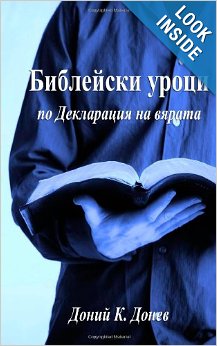Sunday School program from the Declaration of Faith for the Bulgarian Church of God
 Sunday School program from the Declaration of Faith for the Bulgarian Church of God
Sunday School program from the Declaration of Faith for the Bulgarian Church of God
The Sunday School program for the Bulgarian Church of God was envisioned at the end of 2000. Because of the lack of continuity with Sunday School programs taught in the time before the communist Regime and general unavailability for translated curriculum, we created the program from scratch as follows:
2001 Taught first series at the Capital Church of God in Sofia
2002 Presented the newly published Sunday School to the General Presbyters Council of the Bulgarian Church of God
2003 Taught complete Sunday School series at Church of God in Pravetz Bulgaria
2005-2007 Over 40,000 copies of the Sunday School program were printed and distributed among the Church of God congregations
2010 Taught the Sunday School series in the Church of God in Ruse, Bulgaria
2011 Taught all 14 modules of the Sunday School series in the Church of God in Gabrovo, Bulgaria
2013 Taught the modules of the program via the Mobile Bible School
WebMinistry 2.0 for Churches: A Step-by-Step Guide

- WebMinistry 2.0 for Churches {Step-by-Step Guide} Part 1: The Web Process
- WebMinistry 2.0 for Churches {A Step-by-Step Guide} Part 2: 5 Reasons to use WordPress
- WebMinistry 2.0 for Churches {A Step-by-Step Guide} Part 3: WordPress and Its Famous 5 Minute Installation
- WebMinistry 2.0 for Churches {A Step-by-Step Guide} Part 4: Ten Useful Plug-ins
- WebMinistry 2.0 for Churches {A Step-by-Step Guide} Part 5: 5 Things to Learn about WebMinistry 2.0
March is for #MISSIONS
Disciple to the Nations: Matthew’s Missiology
MISSIONS TEST (2012)
MissionSHIFT (2011)
Missions for the Third Millennium (2009-2010)
Pray for our Chaplains on Mission
 Pray for our Bulgarian chaplains who were recently deployed on their next mission in the Middle East. We are not at liberty to publicize their names or current location, but we can mention that they have been a part of our Masters of Chaplaincy Ministry Program now affiliated with the New Bulgarian University (NBU). In the past three years they have successfully undergone the chaplaincy training by Maj. General C. Buckingham, USA (ret), Chaplain Col. R. Young of the IAEC and Dr. J. Ellis of Union University as part of our masters program. We are continuing to pray that they come home safely after their mission and be able to participate in the commencement graduation ceremony with their cohort from this year’s class.
Pray for our Bulgarian chaplains who were recently deployed on their next mission in the Middle East. We are not at liberty to publicize their names or current location, but we can mention that they have been a part of our Masters of Chaplaincy Ministry Program now affiliated with the New Bulgarian University (NBU). In the past three years they have successfully undergone the chaplaincy training by Maj. General C. Buckingham, USA (ret), Chaplain Col. R. Young of the IAEC and Dr. J. Ellis of Union University as part of our masters program. We are continuing to pray that they come home safely after their mission and be able to participate in the commencement graduation ceremony with their cohort from this year’s class.
Restoration of Chaplain Ministry in Bulgaria
Since 1995, Cup and Cross Ministries International has worked toward a vision of the establishment of a Bulgarian Chaplaincy Association – an organization that incorporates pastoral care to prisons, military, police and hospitals. Our outreaches have been able to provide pastoral care and social services to the needy in a time of severe economic crises and political tensions. Our presence has been an answer for people in need for both physical and spiritual support. In the beginning of the 21st century, we are witnesses of a miracle as this vision comes into reality. Today, police and military officers participate in services led by the same ministers and pastors who once, during communism, they were ordered to arrest for the preaching of the Gospel.
History of Events
In September of 1944 the Communist revolution took over Bulgaria. All prior Protestant activates were outlawed. Pastors and ministers were imprisoned. Some were brutally executed. Any attempt for ministry in public was equal to a death sentence. The church went underground for 45 years until the Fall of the Berlin Wall in 1989 and a Holy Ghost revival swept through the country. In the summer of 2000 the Bulgarian Church of God organized a chaplaincy seminar in the Military School in Veliko Turnovo. This was done with the partnership of NATO’s head chaplain along with the representative of the Orthodox Church in Bulgaria, the director of the school under the patronage of the vice-president of Bulgaria Mr. Kavaldjiev. More than 250 officers, spiritual leaders and civil representatives participated. The goal of the seminar was to awaken the interest of the community and appeal for changes in the Bulgarian constitution, which would guarantee the freedom of military personnel to access the chaplain’s services and care.
The Bulgarian Chaplaincy Association
In February of 2002 a chaplaincy seminar, organized along with the Church of God Chaplains Commission, was held in the National Palace of Culture in Sofia. More than 60 pastors, chaplains, students and church workers from different denominations attended. These were people actively involved in military, hospital and prison ministries. The seminar was a stepping-stone for the development of the chaplaincy ministry in Bulgaria. It served as a beginning point of the structural development of the department of chaplaincy and caregivers in the Bulgarian Church of God and facilitated to the establishment of the Bulgarian Chaplaincy Association of which Cup & Cross Ministries became a charter member.
Ukraine in Crisis: What’s happening?
PTS graduate Youry O. wrote us this morning:
S.O.S. Urgent Prayer request from Ukraine!
Dear friends! We ask you to take with us a heavy burden of prayer for our country, Ukraine and our family. As you may know from watching the news, for the last three months our country was struggling from protests and violent clashes between police forces and protesters who tried to overpower corrupt pro-Russian government in the country. There are more then a hundred people killed and tortured, thousands are wounded already. After the former president of Ukraine fled to Russia, the president of Russia, Vladimir Putin, commanded its military forces to invade Crimea (Southern Ukraine), and now there is a serious threat that they will advance into all Eastern part of Ukraine where we live. People are frightened. Economy is staggering. If the conflict escalates on the international level it may even grow into a WWIII. We ask you to think that suddenly some else’s war may very soon consume all of the world. Please, ask your church, your friends and families to pray for safety of our family, for the peace in Ukraine, and for the peace to all of civilized humanity. We do not want our children to see the war in there homeland! Please, do not stand aside.
![frame_ext1-300x168[1]](https://cupandcross.com/wp-content/uploads/2014/03/frame_ext1-300x1681.jpg) DECLARATION OF THE UKRAINIAN CHURCHES AND RELIGIOUS ORGANIZATIONS ABOUT THE FOREIGN AGGRESSION
DECLARATION OF THE UKRAINIAN CHURCHES AND RELIGIOUS ORGANIZATIONS ABOUT THE FOREIGN AGGRESSION
- US Official Claims 6,000 Russian Troops In Complete Control Of Crimea
- Putin Requests Use of Russian Military in Ukraine
- Putin Hints That He May Not Stop at Crimea
- US suspends trade talks, military activities with Russia
- Rumsfeld: ‘It is US weakness that has shaken the world’
- Analysis: Kerry heads to Kiev with policy to counter Putin still evolving
- Crimea becomes flashpoint of Russia, Ukraine drama
- Ukraine fears hit world stock markets
- Ukraine’s UN ambassador vows: ‘We will succeed’
- READ: Ukraine’s letter to United Nations
Who’s in charge of Ukraine?
- Russia’s take: Viktor Yanukovych remains Ukraine’s elected leader, and Ukraine’s new government is illegitimate. Russian United Nations envoy Vitaly Churkin called it an “armed takeover by radical extremists.”
- Ukraine’s take: Ukraine has a legitimate government and is set to have new presidential elections on May 25. “Let’s give an opportunity for that to work,” Ukrainian Ambassador to the U.N. Yuriy Sergeyev said.
- United States’ take: Yanukovych abandoned his post last month, fled the country and was then voted out of office by Ukraine’s democratically elected parliament.
How many Russian troops are inside Ukraine?
- Russia’s take: Russia hasn’t said how many troops it’s sent into Ukraine.
- Ukraine’s take: Russia has sent military ships, helicopters and cargo planes to deploy 16,000 troops into Crimea since February 24, Sergeyev told the United Nations on Monday.
- United States’ take: Russian forces “have complete operational control of the Crimean peninsula,” a senior U.S. administration official told CNN on Sunday, with estimates of 6,000 Russian ground and naval forces in the region
Do Russian troops have a right to be in Crimea?
- Russia’s take: Yes. A treaty between the neighboring nations allows Russia to have up to 25,000 troops in Crimea, Russia’s U.N. envoy said Monday, adding that Yanukovych requested that Russia send military forces.
- Ukraine’s take: No. Russian troops amassing in Crimea and near the border with Ukraine are an “act of aggression.”
- United States’ take: No, and Russian President Vladimir Putin is playing a dangerous game. The consequences of military action “could be devastating,” U.S. Ambassador to the U.N. Samantha Power said Monday.
Why is the tense standoff unfolding now?
- Russia’s take: Russia has said its parliament approved Putin’s use of military force to protect Russian citizens in the Crimean peninsula.
- Ukraine’s take: There’s no evidence of any threat to Russians inside Ukraine. Russia wants to annex Crimea.
- United States’ take: Russia is responding to its own historic sensitivities about Ukraine, Crimea and their place in Moscow’s sphere of influence, a senior White House official told CNN Monday. Russia fears that Ukraine is falling under European or Western influence, the official said.
Prayer and Fasting for Bulgaria
![Fasting[1]](https://cupandcross.com/wp-content/uploads/2014/03/Fasting1-300x187.jpg) Upon Bulgaria’s national holiday (March 3rd), we have called for a 3-day prayer and fasting through our churches in Bulgaria for the following needs:
Upon Bulgaria’s national holiday (March 3rd), we have called for a 3-day prayer and fasting through our churches in Bulgaria for the following needs:
1. National repentance and God’s favor over our nation
2. Political stability in response to the ongoing almost 300-day protest against the current government formation
3. Blessing in place of the increasing economical crises through the eastern countries of the European Union
4. Peace over the increasing military tension in the Black Sea region
5. Complete stop of human trafficking through out the Balkans
The Disciple to the Nations: Matthew’s Missiology
PRAY for #UKRAINE
They are bringing the bodies out of my hotel pic.twitter.com/hjDHjOlQIM
— Daniel Sandford (@BBCDanielS) February 20, 2014
Live Updates: Crisis in Ukraine
FOX News: EU reportedly agrees to impose sanctions on Ukraine as truce falls apart
Reuters: After Ukraine’s bloodiest day, EU tries to broker peace
BBC: Ukraine unrest: EU sanctions imposed
FOX News: Following whipping, anti-Putin punk band posts new video criticizing Sochi Games
CNN: Truce ends, death toll rises in Ukraine
BBC: Why is Ukraine in turmoil?
MISSIONS TEST (2012)
This is a re-post of popular articles on Missiology from 2012:
Missions Test 1: Mission, Method & Message (2012)
Missions Test 2: Means, Motive & Opportunity (2012)
MISSIONS TEST 3: Missionary Testament (2012)
MissionSHIFT (2011)
This is a re-post of popular articles on Missiology from 2011:
MissionSHIFT (Part 1): Paradoxes in Missions (2011)
MissionSHIFT (Part 2): Free Will Missions (2011)
MissionSHIFT (Part 3): WebMissions – The Good, The Bad and The Ugly (2011)


![missions-2014[1]](https://cupandcross.com/wp-content/uploads/2014/03/missions-20141-300x171.jpg)
![s_k01_70616745[1]](https://cupandcross.com/wp-content/uploads/2014/02/s_k01_706167451.jpg)

![201311_Mission_Shift_580x272[1]](https://cupandcross.com/wp-content/uploads/2014/02/201311_Mission_Shift_580x2721.jpg)





